Sondani
| Author:Laxman Burdak , IFS (R), Jaipur |

Sondani (सोंधनी) (also Saudhani,Sondhani) is a small village in tahsil and district Mandsaur in Madhya Pradesh.
Variants
Location

Saudhani village is situated at a distance of about 4 km from Mandsaur situated on Mahu-Nimach National Highway towards Mahu in Madhya Pradesh.
Origin of name
Historical importance
Two monolith pillars were erected here by King Yasodharman in 528 AD with inscription which describe his exploits including victory over Hunas. [1], [2] Excavations by the Indian Archaeology Department show that these pillars are lying at their original site. Nearby was discovered a double head of stone with two faces of lions looking in opposite directions. It was probably the crowning piece of one of the pillars.
Each pillar is of height 40 feet, girth 3.5 feet and weighs 200 ton. [3], [4]The inscription bears verses composed by the poet Vasula, the son of Kakka. This eulogy has been engraved by Govinda. The composition is in Sanskrit language and script is north Indian brahmi. [5], [6]Nagappa and Dasappa were two south Indian artisans who gave shape to these pillars. These pillars were discovered by British officer Sulvin in 1875. John F. Fleet discovered their other pieces. In 1921 Shri V.S. Garde, Director Archaeology Gwalior state, made a terrace and put these pillars over it. [7]
Mandasor Pillar Inscription of Yashodharman
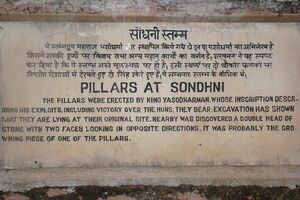
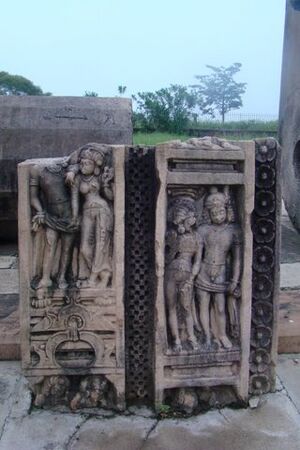
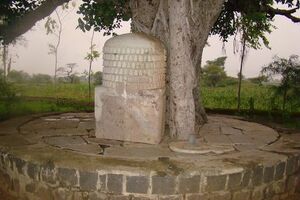
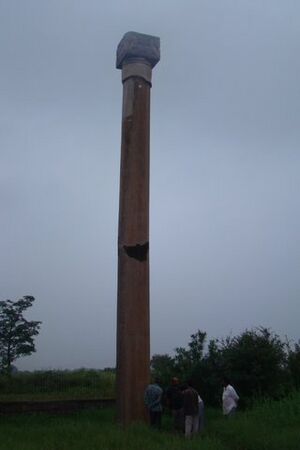
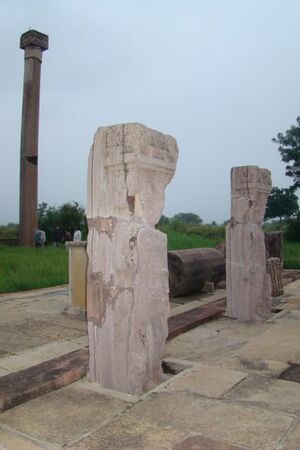
- From: Fleet, John F. Corpus Inscriptionum Indicarum: Inscriptions of the Early Guptas. Vol. III. Calcutta: Government of India, Central Publications Branch, 1888, 147-148.[8]
(Line 1.) May that very long banner of (the god) Shûlapâni destroy the glory of your enemies; (that banner) which bears (a representation of) the bull (Nandi), marked by the five fingers (dipped in some dye and then) placed on him by (Parvati) the daughter of the mountain (Himalaya), who causes the distant regions, in which the demons are driven wild with fear by (his) terrible bellowings, to shake; (and) who makes the glens of (the mountain) Sumeru to have their rocks split open by the blows of his horns!
(Line 2.) He, to whose arm, as if (to the arm) of (the god) Shârngapâni, the fore-arm of which is marked with callous parts caused by the hard string of (his) bow, (and) which is steadfast in the successful carrying out of vows for the benefit of mankind, the earth betook itself (for succour), when it was afflicted by kings of the present age, who manifested pride; who were cruel through want of proper training; who, from delusion, transgressed the path of good conduct; (and) who were destitute of virtuous delights:
(L. 3.) He who, in this age which is the ravisher of good behaviour, through the action simply of (his good) intentions shone gloriously, not associating with other kings who adopted a reprehensible course of conduct, just as an offering of flowers (is beautiful when it is not laid down) in the dust; he in whom, possessed of a wealth of virtue, (and so) falling but little short of Manu and Bharata and Alarka and Mandhatri, the title of "universal sovereign" shines more (than in any other), like a resplendent level (set) in good gold:
(L. 4.) He who, spurning (the confinement of) the boundaries of his own house, enjoys those countries, thickly covered over with deserts and mountains and trees and thickets and rivers and strong-armed heroes, (and) having (their) kings assaulted by (his) prowess, which were not enjoyed (even) by the lords of the Guptas, whose prowess was displayed by invading the whole (remainder of the) earth, (and) which the command of the chiefs of the Hunas , that established itself on the tiaras of (many) kings, failed to penetrate:
(L. 5.) He before whose feet chieftains, having (their) arrogance removed by the strength of (his) arm, bow down, from the neighbourhood of the (river) Lauhitya up to (the mountain) Mahendra, the lands at the foot of which are impenetrable through the groves of palmyra-trees, (and) from (Himalaya) the mountain of snow, the tablelands of which are embraced by the (river) Ganga, up to the Western Ocean, by which (all) the divisions of the earth are made of various hues through the intermingling of the rays of the jewels in the locks of hair on the tops of (their) heads:
(L.6.) He by whom (his) head has never been brought into the humility of obeisance to any other save (the god) Sthanu; he, through the embraces of whose arms (Himalaya) the mountain of snow carries no longer the pride of the title of being a place that is difficult of access; he to whose two feet respect was paid, with complimentary presents of the flowers from the lock of hair on the top of (his) head, by even that (famous) king Mihirakula, whose forehead was pained through being bent low down by the strength of (his) arm in (the act of compelling) obeisance:
(L. 7.) By him, the king, the glorious Yashodharman, the firm beams of whose arms are as charming as pillars, this column, which shall endure to the time of the destruction of the world, has been erected here, as if to measure out the earth; as if to enumerate on high the multitude of the heavenly lights; (and) as if to point out the path of his own fame to the skies above, acquired by good actions; (this column) which shines refulgent, as if it were a lofty arm of the earth, raised up in joy to write upon the surface of the moon the excellence of the virtues of Yashodharman, to the effect that "His birth (is) in a lineage that is worthy to be eulogised; there is seen in him a charming behaviour that is destructive of sin; he is the abode of religion; (and) the (good) customs of mankind continue current, unimpeded (in any way) by him."
(L. 9.) From a desire thus to praise this king, of meritorious actions, (these) verses have been composed by Vasula, the son of Kakka. (This eulogy) has been engraved by Govinda.
Notes
- The Markandeya Purana is a famous one amongst the eighteen puranas, mentions that Rtadhvaja then resigned his kingdom to Alarka and departed to the forest. ... See at http://www.exoticindiaart.com/book/details/IDF435
- The word Locks of hair is translation of the sanskrit word Jata (जट). It is to be confirmed from the original inscription if the word is Jata ((जट)) there or not and if it is used for his clan as Jat.
References
- ↑ Usha Agarwal:Mandsaur Zile Ke Puratatvik samarakon ki paryatan ki drishti se sansadhaniyata - Ek Adhyayan, Chirag Prakashan Udaipur, 2007, p. 19
- ↑ Mangal Mehta (Ed): Dashpur Janapada aur sanskriti, p. 142
- ↑ Usha Agarwal:Mandsaur Zile Ke Puratatvik samarakon ki paryatan ki drishti se sansadhaniyata - Ek Adhyayan, Chirag Prakashan Udaipur, 2007, p. 19
- ↑ H.Michael Brown (Ed): Gwalior Today, p. 180
- ↑ Usha Agarwal:Mandsaur Zile Ke Puratatvik samarakon ki paryatan ki drishti se sansadhaniyata - Ek Adhyayan, Chirag Prakashan Udaipur, 2007, p. 20
- ↑ Sriram Goyal:Guptakalin Abhilekh, p. 366
- ↑ Usha Agarwal:Mandsaur Zile Ke Puratatvik samarakon ki paryatan ki drishti se sansadhaniyata - Ek Adhyayan, Chirag Prakashan Udaipur, 2007, p. 20
- ↑ http://www.gurjarindia.com/History/Mandasor.htm
External links
Back to Jat Villages

